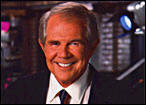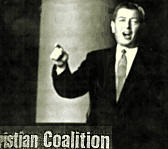 |


|
|
Will the Christian Coalition Survive? By Bill Berkowitz
Robertson's early-December resignation from the powerful political organization he founded certainly doesn't mean he's giving up the spotlight. He will still be hosting his daily 700 Club television program, and running his multimillion-dollar business empire. Robertson's been swimming in sea of ridicule over the past few months. Always one to shoot from the lip, in early October, he told an audience at the 40th anniversary celebration of his Christian Broadcasting Network that: "The Lord is getting ready to shake this nation. We have not yet seen his judgment in America. This thing that happened in New York was child's play compared to what's going to happen."
Robertson has also taken a pummeling in the press, particularly by Washington Post columnist Colbert King, over some questionable business deals including a gold mining scheme with Liberia's dictator Charles Taylor. (For more on this, see "A non-war update: Other news of Right wing activities you may have missed" - http://www.workingforchange.com/article.cfm?ItemID=12348 .) In addition, his business dealings with China and statements he made supporting its controversial "family planning" practices have irritated a number of colleagues on the right over the past few years. Despite the apocalyptic visions he set out in a number of his books, charges of anti-Semitism, and a series of loopy predictions, Robertson managed to establish and maintain his position as a major figure on the Christian Right and a power broker within the Republican Party for the better part of the nineties. Robertson founded the Christian Coalition in 1898, shortly after he failed to win the Republican Party 1988 presidential nomination. He turned the mailing list generated by the campaign into the most influential and technologically sophisticated grassroots political force on the right. With Robertson at the helm and the cherubic and political savvy Ralph Reed as executive director, donations poured in, membership soared, conservative politicians showed up in droves at the Coalition's annual "Road to Victory" conferences, and the organization perfected the art of the one-sided voter "guide." In his resignation letter, sent to the Coalition's Board of Directors, Robertson wrote: "We are seeing an outpouring of revival power in the United States that exceeds anything that I have known in my lifetime…With the few years left to me of active service, I must focus on those things that will bring forth the greatest spiritual benefit." Robertson added: "…it is now time for the Lord to raise up someone to take my place and to mobilize a whole new cohort of patriotic Americans to swell the ranks of those who have faithfully supported us in the past."
Do not fret, Robertson won't be sitting home watching the soaps and gobbling bonbons. Despite being prone to bizarre comments, he will continue to serve as Chairman and CEO of The Christian Broadcasting Network (CBN). Founded in 1960, CBN describe itself as "one of the world's largest television ministries producing programming seen in over 90 nations and heard in over 65 languages around the world. CBN's broadcast of its flagship program, The 700 Club (hosted by Robertson), remains one of the longest running religious television shows, reaching an average of one million American viewers daily." Robertson is also the Chancellor and Interim President of Regent University, the graduate school he founded in 1978. Troubled times at the Christian Coalition What about the Christian Coalition? Will Robertson's resignation sound the death knell for the organization? It is generally recognized that the Coalition, once the premiere group within the broad constellation that constitutes the Religious Right, has basically been a shell of a national organization over the past few years.
The organization also split into two separate entities: Christian Coalition International, which could openly endorse candidates and make campaign contributions; and the tax-exempt Christian Coalition of America (formerly the Christian Coalition of Texas) which carried on many of the organization's previous activities, including the distribution of CC voter "guides." Barry Lynn, executive director of Americans United for Separation of Church and State, longtime critic of the Coalition, said that the organization had been a "sinking ship" for years "and now the captain's jumped overboard." Stephen Medvic, a political analyst at Old Dominion University, told the Associated Press that Robertson's leaving was "symbolic of the decline of the Christian Coalition." Robert L. Maginnis, vice president of policy for the conservative Family Research Council, told the Unification Church-owned Washington Times that "anyone who watches the Christian Coalition knows it doesn't have a big profile these days." Maginnis was acknowledging the fact that there are several organizations on the Christian Right that have stepped forward over the past few years and taken up the slack created by a weakened Coalition. These groups include, but are not limited to, Dr. James Dobson's Focus on the Family, Lou Sheldon's Traditional Values Coalition, the Washington lobbying outfit, the Family Research Council, Beverly LaHaye's Concerned Women for America and its Culture and Family Institute, and Dr. D James Kennedy's Coral Ridge Ministry. Can the Coalition reload? After Robertson resigned, Roberta Combs was quickly promoted from executive vice president to president. Will it be possible for her to right the "sinking ship?" Combs might be one of the few people who thinks she can. According to Charisma News Service (CNS), Combs was optimistic about the future, claiming that the Coalition would rebuild with "a new generation of leadership who are also committed to giving Christians a voice and defending America's godly heritage." Combs is a longtime Coalition operative who is no stranger to political hardball and not afraid of making the tough calls. According to an October 3, 1999 article in The St. Petersburg Times, in 1999 "she took an ax to the Christian Coalition… gutting the nation's most prominent organization of religious conservatives so badly it may not recover in time to be a significant force in the 2000 election year." The Times reported that earlier that year, Combs "fired, demoted or drove away much of the coalition's seasoned political staff. Many of these conservative activists worked under the coalition's former executive director, Ralph Reed, who built the coalition into a political powerhouse before leaving in 1997 to become a Republican political consultant. "Defenders of Combs, who officially is executive vice president for national operations, say she was simply clearing out dead wood. 'I know on a national level she had to really go up there and clean house at the invitation of Pat Robertson. People were kindly permitted to leave rather than be asked to leave. Some of them have been quite snide in their comments,' said Dee Benedict, a member of the South Carolina Christian Coalition board." Combs has known Robertson since 1988, when he she headed up his South Carolina campaign. She became the director of the state's Christian Coalition chapter, "leading religious conservatives in an attempted take-over of the state GOP apparatus…." According to the Times, "former Republican Gov. Carroll Campbell had a much publicized break with Combs after she reneged on an agreement to support his election as a delegate to the 1996 Republican National Convention. Cyndi Mosteller, a Charleston-area religious conservative who has appeared on ABC's Politically Incorrect, said Combs did the same to her." CNS reported that Combs paid tribute to Robertson's "vision and tremendous sacrifice to give Christians a seat at the table," which she said had been "the inspiration for millions who are now in their communities actively defending America's godly heritage." She added: "During this time of national crisis, as Americans are turning to prayer in record numbers, it is imperative that the Christian Coalition continue to build on [its] solid foundation." She dismissed suggestions the organization was a spent force. "We are excited [about the future]," she told CNS. "As long as we can educate and activate people we can always have an impact." She claimed that the organization distributed some 70 million voting guides during last year's election. Spent force, sinking ship… you pick the metaphor. Suffice to say, without the high-profile leadership of Pat Robertson and with no Ralph Reed-like figure ready to step in and take charge, the Christian Coalition has certainly seen its better days. Bill Berkowitz is an Oakland-based freelance writer covering right-wing movements. Contact him at wkbbronx@aol.com. |

© 1997-2002 BEI
 Pat Robertson: Goodbye Christian Coalition
Pat Robertson: Goodbye Christian Coalition  While America mourned, Robertson and Falwell took the opportunity to attack liberals
While America mourned, Robertson and Falwell took the opportunity to attack liberals  Despite having friends in high places, like John Ashcroft in the attorney general's office, the Coalition found itself in hot water in recent years
Despite having friends in high places, like John Ashcroft in the attorney general's office, the Coalition found itself in hot water in recent years